The SSD Update: Vertex Gets Faster, New Indilinx Drives and Intel/MacBook Problems Resolved
by Anand Lal Shimpi on March 30, 2009 12:00 AM EST- Posted in
- Storage
The Bright Side: The Vertex is Nearly 3x as Fast
Immediately after I published the anthology, I asked OCZ for a shipping version of the drive. I wanted final hardware, updated firmware, shrink wrap, the whole 9 yards. Here’s what I got:
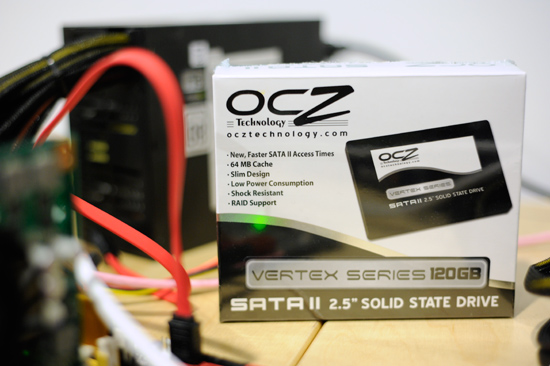
The drive itself looked identical to the first Vertex I tested, but the differences were all internal. The new drive used a new PCB layout, let’s pop the top off to see it:
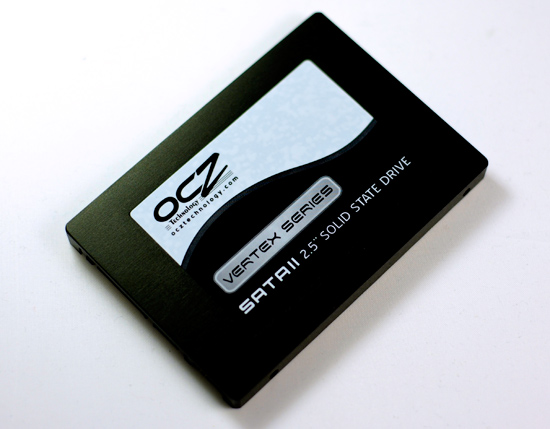
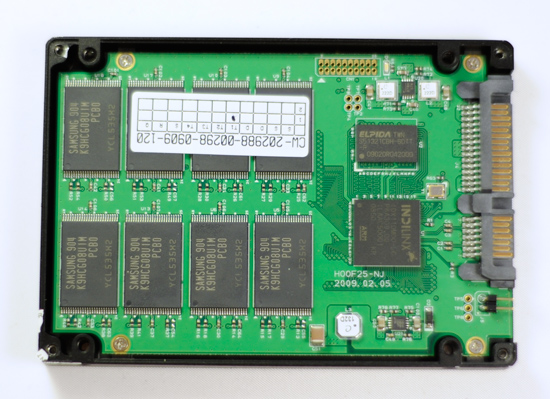
Oooh.
The major change on the new board layout is the addition of a 2-pin jumper on the back of the drive to allow the drive’s firmware to be updated by the end user. OCZ tells me that as of 1275, the jumper is no longer needed to update the firmware so it looks like it was a short lived change.
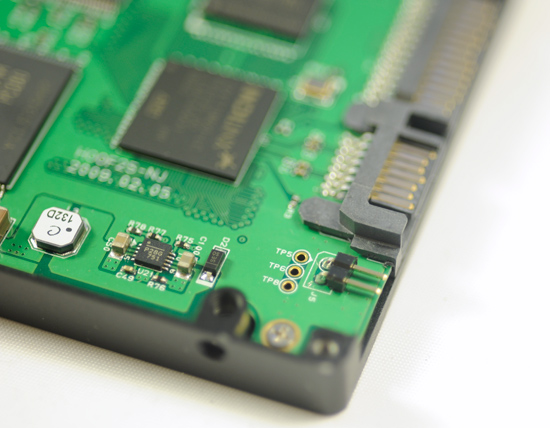
While OCZ claims that there’s significant validation done on each firmware revision, without a doubt it’s significantly less than what every Intel and Samsung drive goes through. There’s a certain amount of risk you take when jumping on the unproven hardware bandwagon, so as always proceed with caution. It’s worth looking into
While I haven’t done much testing on 1275, I can’t blame you if you want to try the firmware out right away because it is good.
I’ll start with the best news first. I looked at 4KB random write performance once again using iometer. This test is the same one I used in last week’s review; a 3 minute run, 3 outstanding IOs, 4KB random writes spread out over an 8GB section of LBAs. I filled the drive completely before running the test.
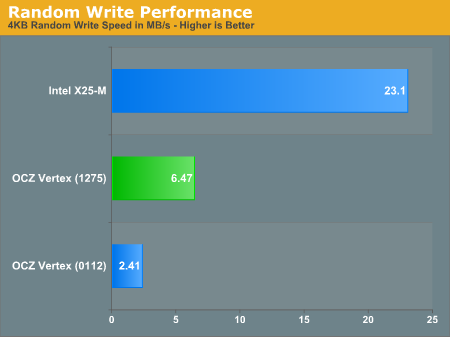
| Random Write (4KB Block, 3 IOs) | IOPS | Transfer Rate | Average Latency (ms) |
| Intel X25-M | 5923 | 23.1 MB/s | 0.51 ms |
| OCZ Vertex 1275 | 1656 | 6.47 MB/s | 1.81 ms |
| OCZ Vertex 0112 | 617 | 2.41 MB/s | 4.86 ms |
Yeah. It’s fast. Not quite as fast as Intel’s X25-M but it’s good. Average latency has dropped quite a bit. The Vertex using firmware 1275 performs used at about the level that the original firmware performed brand new. The Intel drive can still crunch through over 3.5x the number of IOs per second as the Vertex, but it also costs nearly 2x per GB. The Vertex proves itself an interesting value alternative.
I then looked at random read performance. Now most SSDs do just fine here, even the JMicron based ones.
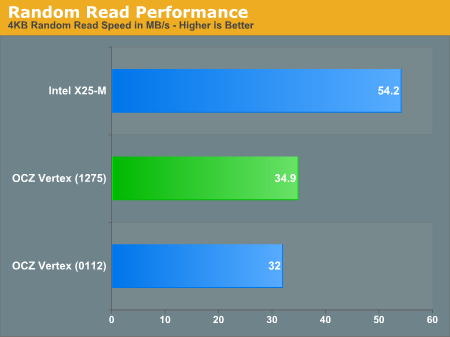
| Random Read (4KB Block, 3 IOs) | IOPS | Transfer Rate | Average Latency (ms) |
| Intel X25-M | 13883 | 54.2 MB/s | 0.22 ms |
| OCZ Vertex 1275 | 8931 | 34.9 MB/s | 0.34 ms |
| OCZ Vertex 0112 | 8184 | 32.0 MB/s | 0.37 ms |
The new firmware bumped up the Vertex’s performance by about 9%.
I spoke briefly with one of OCZ’s flash engineers and it seems like the reason the 1275 firmware is so much faster in random write speed is because of a bug in the 0112 firmware I tested with. There was apparently a problem with the 0112 firmware that prevented the controller from writing to as many flash devices as possible in parallel. The 1199 firmware fixed this, which explains why the sudden rush to ship the firmware. Unfortunately it looks like that version also has problems and thus we end up back at square one again. There’s no free lunch folks.
Sequential read performance showed a very marginal performance improvement:
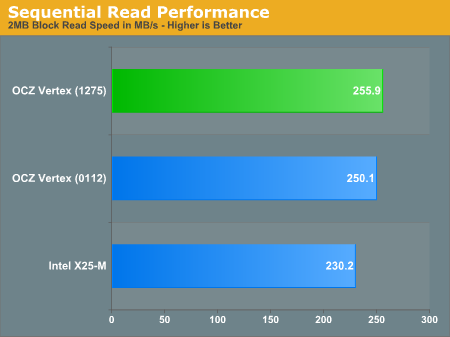
| Sequential Read (2MB Block, 1 IO) | IOPS | Transfer Rate | Average Latency (ms) |
| Intel X25-M | 115.1 | 230.2 MB/s | 8.7 ms |
| OCZ Vertex 1275 | 127.9 | 255.9 MB/s | 7.8 ms |
| OCZ Vertex 0112 | 125.1 | 250.1 MB/s | 8.0 ms |
But sequential write performance went up tremendously:
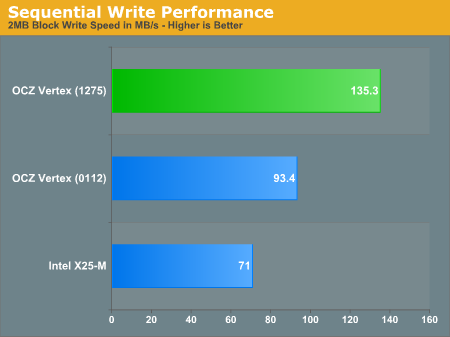
| Sequential Write (2MB Block, 1 IO) | IOPS | Transfer Rate | Average Latency (ms) |
| Intel X25-M | 35.5 | 71 MB/s | 28.2 ms |
| OCZ Vertex 1275 | 67.7 | 135.3 MB/s | 14.8 ms |
| OCZ Vertex 0112 | 46.7 | 93.4 MB/s | 21.4 ms |
The Indilinx (and most other) drives offer better sequential read/write speed than the X25-M. Intel optimized for the most important characteristics for a desktop: random read/write performance, while most other manufacturers optimized for sequential read/write. Indilinx is the first to seem to want to really drive sequential without completely forgetting about random performance.










73 Comments
View All Comments
The0ne - Monday, March 30, 2009 - link
imo, flash memory is going to be pretty big this year and the coming years. I'm already anticipating very high capacity flash memory since the technology is already there to push it up to 2TB. It's just a matter of time, cost and market to be able to get to those levels. As for SSD I think it's picking up but not as quickly as most had hoped for, myself included. And again, IMO, I think SSD technology is still in the infant stages where there are still lots of improvements to be made. Speed (write/read) and capacities are the two major ones of course.iwod - Monday, March 30, 2009 - link
It seems Samsung's Controller wont be that good at all. At least from the look of it, it will be worst then Vertex's one.Which is strange since they are the largest Flash manufacture in the world. Does it make sense to develop the best SSD conrtoller to improve Flash sales?
siuba - Monday, March 30, 2009 - link
it seems slow peroformance on intel x25-m, i can get 38xxx PCMark Vantage HDD Score after HDD Erase, but the overall i can say vertex can outperformance x25-mduploxxx - Monday, March 30, 2009 - link
2 very nice articles regarding ssd, although i am not so convinced what to buy, ocz or intel one, since both have similar performance in real world apps i believe it is more a price discussion.the one thing i miss in both reviews, is the failure rates, the burn in rate and the way they prevent the burn in by more capacity then rated, write, mixture, etc.....
Afterall that is one of the main reason why many large storage vendors are still offering this solution as a second line-up (except for the prcie/gb offcourse and the issue that few of those disks kill there global controller performance)
any news on that part and new enhancements in the future.
Denithor - Monday, March 30, 2009 - link
Page 3 - midway down the page - you refer to 'firmware 0112' - should be 0122 (several instances in one paragraph).andreschmidt - Monday, March 30, 2009 - link
Just as I were on the fence to try out the Intel X25-M I hear rumblings of their Solid State Drive roadmap.Would be a real shame to buy the relatively pricey X25-M 80GB ($481 in Denmark) only to see it replaced in the next month or two by an even better product by Intel.
Good follow-up article though.
7Enigma - Wednesday, April 1, 2009 - link
With this latest firmware update I would not be pulling the trigger on the Intel drive. Unless there are some serious defects with the latest Vertex firmware, 2 drives in RAID0 have to be superior in performance, not to mention the extra capacity.I would definitely wait, but not for the Intel drive, but rather for the confirmation the latest firmware for the Vertex is solid.
strikeback03 - Thursday, April 2, 2009 - link
Dunno, that difference in random writes (1st graph page 3) seems more than RAID would help. Combine that with the face that I have never had a good experience with onboard RAID and never seen it make a large difference in real-life timing, if Intel dropped their price to something closer to the OCZ I'd rather stich to a single drive (though the fact that Intel doesn't really have a drive capacity that suits my needs well doesn't help either).IntelUser2000 - Monday, March 30, 2009 - link
It wouldn't be 1-2 months for the next generation Intel SSD drives. The previous SSD roadmaps indicate the 34nm SSDs at Q4 of this year. We might see the rumored 120MB/s firmware for X25-M though. Whether it can be updated to support the older firmware drives is another question.IntelUser2000 - Monday, March 30, 2009 - link
Ehem, 120MB/s writes.